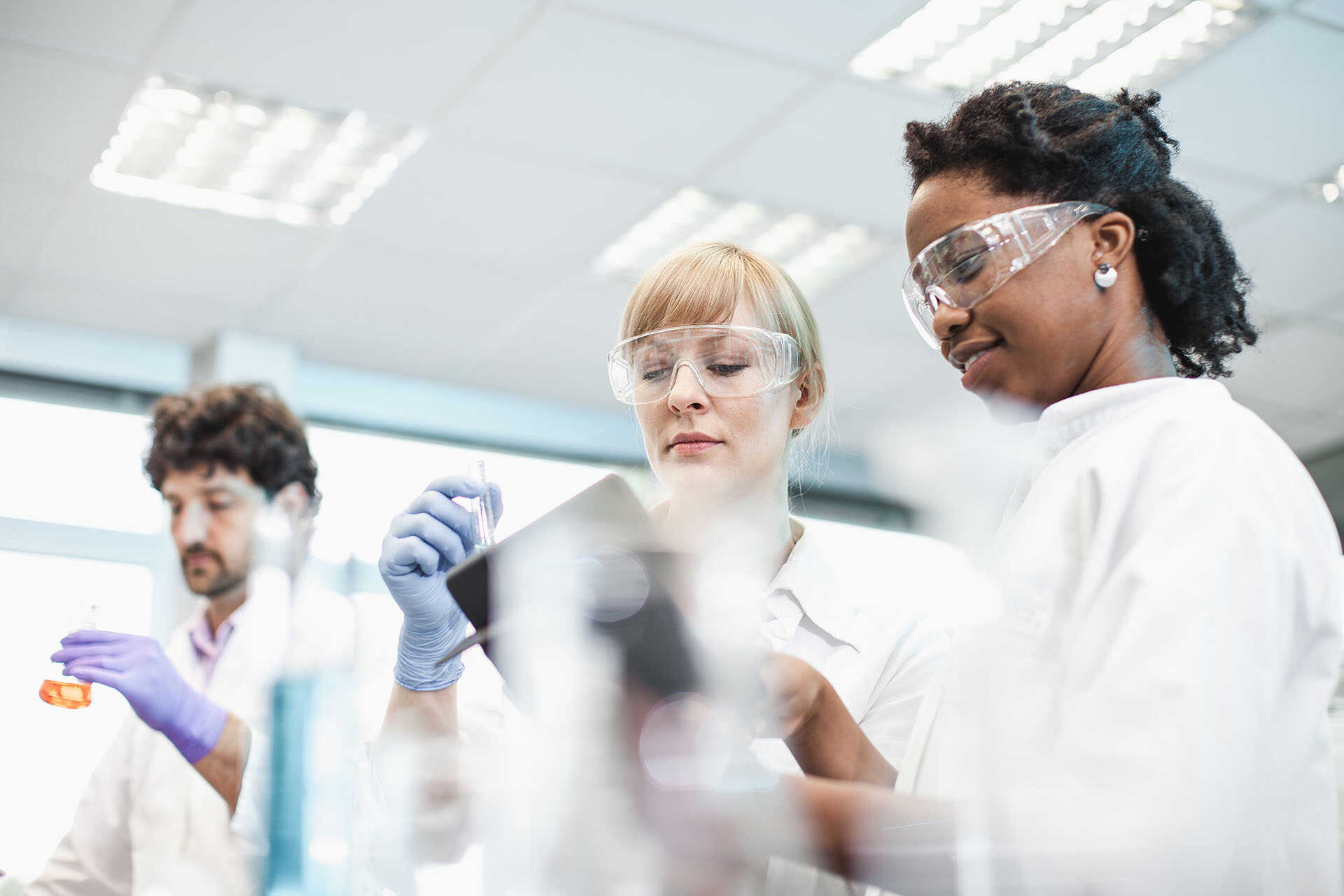Pharmacy
with Preparatory Year
Take the first step towards a rewarding career in pharmacy supporting hospitals, patients and communities.

Take the first step towards a rewarding career in pharmacy supporting hospitals, patients and communities.
Become the point of contact for patients for the safe and effective use of medicines. Our four-year Pharmacy programme prepares you for a successful career as a pharmacist in community or hospital settings.
Hosted at the Medway School of Pharmacy, our fully accredited programme is based on three interlinked themes: practitioner and patient; medicines design and manufacture; the patient; and disease and drug action. Our curriculum is outcomes-focused and designed to prepare you for your future professional practice. You study basic and applied science as well as clinical and professional practice, all in the context of patient care. You will also undertake external placements throughout your course, so that by the time you graduate you have the skills and the confidence to kickstart your career.
The foundation year helps you adapt to the higher education system and to develop and embed key academic and employability skills.

Regular investment in our facilities ensures that you will be developing as a pharmacist in a world-class learning environment
The Medway School of Pharmacy has achieved full accreditation from the General Pharmaceutical Council and is recognised as an established school of pharmacy.

The British Pharmaceutical Student Association holds local branch meetings at Medway and runs conferences and seminars - get involved and build your network.
We make use of tutorials, workshops and practical laboratory classes as well as in-house simulation-based learning to foster your understanding and development.

You can join the student-led Medway Pharmacy Students' Association who organise a number of social activities such as trips, movie nights and sporting events.
Our typical offer levels are listed below. If you hold alternative qualifications just get in touch and we'll be glad to discuss these with you.
Suitable applicants will be required to attend an interview.
CCC including a relevant Science subject
MMM from an Extended Diploma in Applied Science
26 points overall including Higher Level in a relevant Science subject at grade 3
GCSE Mathematics and GCSE English Language at grade 4/C
N/A
T levels in Laboratory Science may be considered.
96 UCAS points from a relevant Science Access to HE Diploma
This module aims to bring all students up to a secure level of fundamental knowledge and skills in the chemical sciences such that they are prepared to enter the first year of the Masters of Pharmacy programme. Knowledge gained in this module will underpin students’ future learning in chemistry and pharmaceutics.
This module aims to provide you with a strong mathematical foundation, enabling you to engage confidently with mathematical principles in subsequent levels of study. It will help you develop essential skills in data collection, analysis, and interpretation, while also building the knowledge and proficiency needed for further study at Level 4. The module fosters an inclusive learning environment to support your academic growth.
The aim of this module is to provide you with a foundational understanding of key concepts in biology. This knowledge will support all your future learning in the disciplines of biosciences and pharmacology as you progress through the Master of Pharmacy programme.
The aim of this module is to equip you with the practical skills and theoretical knowledge needed to understand both quantitative and qualitative research methods, identify key stages of the research process, and critically evaluate scientific literature. You will also be introduced to fundamental laboratory techniques, procedures, and skills essential for conducting critical laboratory experiments safely and effectively. The knowledge and skills gained in this module will support your understanding of future topics within the MPharm course, including your individual research project.
This module is designed to introduce the student studying on the Master of Pharmacy Foundation Year to the skills needed to work in a pharmacy. The focus will be on the knowledge and skills required of a Medicines Counter Assistant working in a pharmacy. A student successfully completing this module will have the theoretical knowledge to start work in a pharmacy in order to gain the additional practical experience required to become a Medicines Counter Assistant. Where a student successfully transfers onto the Master of Pharmacy Programme, they will focus on developing the knowledge and skills required to become a pharmacist.
In order to progress to Stage 1 of the MPharm programme, a student must achieve a minimum of 60% in each module, successfully pass a selection event and demonstrate professional requirements: satisfactory Disclosure and Barring Service (DBS) checks (or equivalent for international students), full health and vaccination declaration (with supporting evidence) and Fitness to Practise Declaration.
Students on the MPharm Preparatory year (stage 0) who do not progress to stage 1 of the MPharm programme but achieve at least 40% overall in a module will pass the module. Students who achieve 120 credits at Level 3 will be directed to potential alternative degrees from either of the Universities.
The aim of this module is to develop your knowledge and understanding across a range of disciplines, including cell biology, genetics, and the human anatomy and physiology of the major body systems. Additionally, selected examples of pathophysiology will introduce you to the concepts of human diseases and therapeutics, providing the foundational knowledge required to develop a deep understanding of pharmacology and therapeutics in subsequent modules.
This module aims to develop your professional competencies in patient safety and quality, demonstrating how these are applied in practice environments through simulation and supervised real-world experiences during placements. Patient safety focuses on avoiding unintended or unexpected harm during healthcare delivery, using a range of tools and techniques to enhance safety and quality.
The module will cover areas such as patient safety and culture, teamwork, communication, safety, risk and quality, optimising human and system factors, and recognising, responding to, and disclosing patient safety incidents. You will begin by working on cases involving straightforward patients and issues at Stage 1, progressing to more complex scenarios by Stage 4. This module primarily assesses skills, integrating teaching on the skills and attributes developed across other modules within the year or stage.
This module aims to provide you with detailed knowledge and understanding of key aspects of pharmaceutical chemistry and pharmaceutics, focusing on the synthesis, physico-chemical properties, and formulation of drugs. This foundational knowledge will support your understanding of medicinal chemistry and pharmaceutics in later stages of the programme.
Additionally, the module offers essential background knowledge for understanding the mechanisms of drug action and the chemical origins of toxicity, which will also be explored in greater depth in subsequent stages of the MPharm.
This module provides the foundation for professional pharmacy practice, focusing on the development of effective communication and consultation skills. You will explore the principles of equality, diversity, and inclusivity to support patient-centred care. The module also covers the legal and ethical considerations in pharmacy practice, along with the legal framework within which a pharmacist operates.
You will gain an understanding of healthcare, professional, and regulatory organisations, and how they impact professional pharmacy practice. Core clinical assessment skills, including the principles of responding to symptoms, will be covered, alongside the ability to undertake safe, accurate, and appropriate dispensing and pharmaceutical calculations.
Finally, the module will explore the concepts of self-actualisation as a pharmacist, emphasising professional development through reflective practice and continuing professional development.
This module aims to provide you with detailed knowledge and understanding of the anatomy and physiology of specific body systems. You will also develop an understanding of the differential diagnosis of major and minor illnesses affecting these systems, along with their associated pathophysiologies.
The module further explores prevention and treatment strategies for these conditions, encompassing both pharmacological and non-pharmacological interventions, grounded in evidence-based science.
This module aims to develop your professional competencies in patient safety and quality, demonstrating how these are applied in practice environments through simulation and supervised real-world experiences during placements. Patient safety focuses on avoiding unintended or unexpected harm during healthcare delivery, using a range of tools and techniques to enhance safety and quality.
The module covers areas such as patient safety and culture, teamwork, communication, safety, risk and quality, optimising human and system factors, and recognising, responding to, and disclosing patient safety incidents. You will begin with cases involving straightforward patients and issues at Stage 2, progressing to more complex scenarios by Stage 4. This module primarily assesses skills, integrating teaching on the skills and attributes developed across other modules within the year or stage.
This module builds upon the foundational knowledge of pharmaceutical chemistry and pharmaceutics concepts introduced in Science of Medicines 1, applying these principles to the formulation of medications in various dosage forms. You will explore how medicines interact with the human body to achieve desired therapeutic outcomes.
The module also covers the chemistry of drug-drug interactions, drug-packaging system interactions, and their impact on the stability of drugs during storage. Additionally, you will examine the role of pharmacists in the modern pharmaceutical industry and gain insight into research skills relevant to conducting studies in pharmaceutical sciences.
This module aims to develop your consultation and decision-making skills to support patient-centred care. You will apply relevant theories and clinical skills through case-based scenarios, focusing on responding to symptoms. The principles of equality, diversity, and inclusivity will inform your professional decision-making throughout the module.
The first aim of the module is to give you a detailed knowledge and understanding of the anatomy and physiology of a specific body system not previously covered in earlier stages, namely, the nervous system. The second aim is to provide knowledge and understanding of cancer and cell biology plus infections and immunity. This will be accompanied by gaining understanding of specific prevention and treatment strategies for these conditions, covering pharmacological and non-pharmacological interventions and their basis in evidence-based science.
You'll develop and demonstrate professional competencies in patient safety and quality improvement. These skills will be applied in practice environments through simulation-based learning and supervised real-world experiences during placements.
Patient safety focuses on preventing unintended or unexpected harm during healthcare delivery. To achieve this, you will explore and utilise a range of tools and techniques designed to enhance safety and drive improvements in healthcare quality.
This module aims to develop you into a confident pharmacist practitioner with the pharmaceutical and therapeutic expertise needed to contribute effectively within a multidisciplinary team. You'll learn to provide advice for increasingly complex patients requiring advanced health and care interventions.
You will achieve this by undertaking appropriate clinical assessments, considering the patient as a whole, and applying scientific knowledge to make reasoned decisions on prescribing and medicines optimisation. Your decision-making will also incorporate pharmacogenetics, pharmacoeconomics, and pharmacovigilance, all aimed at improving patient outcomes.
This module builds on the foundational knowledge from Science of Medicines 2, enhancing your understanding of advancements in pharmaceutical science and formulation design.
You will explore topics such as advanced drug delivery systems and diagnostics, while also gaining insight into the significance and development of gene-based medicines and vaccines. This module aims to deepen your expertise in these cutting-edge areas of pharmaceutical science.
Gain key professional competencies in patient safety and quality improvement, demonstrating the ability to apply through simulation-based learning and supervised real-world practice during placements.
Patient safety focuses on preventing unintended or unexpected harm to individuals during healthcare delivery. To achieve this, you'll explore a variety of tools and techniques designed to enhance safety and drive continuous quality improvements within healthcare settings.
You'll focus on enhancing your knowledge and critical understanding of the pharmacist’s role in promoting the effective use of medicines across diverse populations. Emphasis is placed on addressing comorbidities, social and structural challenges, and deprescribing practices.
You'll develop problem-solving skills and rational decision-making abilities within a patient-centred framework, incorporating professional accountability, leadership, and responsibility to ensure safe and effective pharmacy practice.
This module provides students with the opportunity to undertake a Master’s-level research project. It integrates the cognitive abilities, practical expertise, and transferable skills developed during the first three years of the programme, culminating in a sustained and comprehensive research project.
Develop the knowledge and skills required for safe and effective non-medical prescribing. You'll explore the legislation and accountability frameworks underpinning non-medical prescribing, along with the safety principles essential to prescribing practice.
The module covers key pharmacological and pharmacodynamic knowledge related to commonly used drugs within the chosen scope of practice, fostering safe and informed prescribing decisions. You'll develop clinical and consultation skills necessary to prescribe safely and effectively within relevant systems and frameworks for medicines use. Ethical decision-making, remote prescribing, and adherence to legal requirements are also emphasised throughout the module.
The MPharm programme is centred around three main themes; the medicine, the patient and the professional. These aspects come together and are integrated through demonstrating patient care around integrated cases. We have a strong focus on developing professional actualisation and working with other health and care professionals as part of a multidisciplinary team working around, and improving the care of, patients and the public. The importance of learning from and about a range of health and care is developed through the programme.
A range of teaching methods will be used from traditional lectures and video recordings, seminars, tutorials, laboratory sessions, practical's, online work, reading, independent study, reflecting on assignment feedback and practice-based learning.
This will be delivered in person, online (using computer aided learning) and via patient-simulation with our standardised patients. This is supported by developing our high fidelity simulations enabling the provision of a realistic and safe environment supporting the development of knowledge and skills.
Application and demonstration of knowledge and skills through teaching and learning is critical to embedding learning. The placement in the workplace further builds on this and contextualises practice whilst also building links with a range of health and care professionals.
A range of different assessment types will be utilised, from written examinations, multiple choice question tests, coursework (for example laboratory assessments, professional and therapeutic decision making), oral presentations, poster presentations, clinical simulation activities with standardised patients, patient safety competences (including pharmaceutical calculations, dispensing and portfolio activities) and production of a research paper.
For a student studying full time, each academic year of the programme will comprise 1200 learning hours which include both direct contact hours and private study hours. The precise breakdown of hours will be subject dependent and will vary according to modules.
Methods of assessment will vary according to subject specialism and individual modules.
Please refer to the individual module details under Course Structure.
At the Medway School of Pharmacy our teaching, assessments and facilities are designed not only to ensure a high-level student experience, but to embed employability at every turn. Our extensive network of teacher practitioners are there to provide guidance for your studies and professional development. They will support you through a number of external placements in hospitals and community pharmacies.
In your first year, you spend one and a half days in a community pharmacy. You then spend three days in hospital and one week in a community pharmacy during your second year of study. In Year 3, you go out to a hospital and a community pharmacy for one week each. A self-arranged two-week placement in a community pharmacy, hospital, GP surgery or industry is part of your final year of study.
This extensive support and work experience you receive ensures that after you have the skills and confidence to launch your career.
For courses taught at the Medway School of Pharmacy please visit their undergraduate course pages.
The University will assess your fee status as part of the application process. If you are uncertain about your fee status you may wish to seek advice from UKCISA before applying.
For details of when and how to pay fees and charges, please see our Student Finance Guide.
New students are subject to a number of small mandatory costs at the start of their course of around £100 in total.
Find out more about accommodation and living costs, plus general additional costs that you may pay when studying at Kent.
Kent offers generous financial support schemes to assist eligible undergraduate students during their studies. See our funding page for more details.

We have a range of subject-specific awards and scholarships for academic, sporting and musical achievement.

Student Life

Powered by progress
Kent has climbed 12 places to reach the top 40 in The Times Good University Guide 2025.
Kent Sport
Kent has risen 11 places in THE’s REF 2021 ranking, confirming us as a leading research university.

An unmissable part of your student experience.